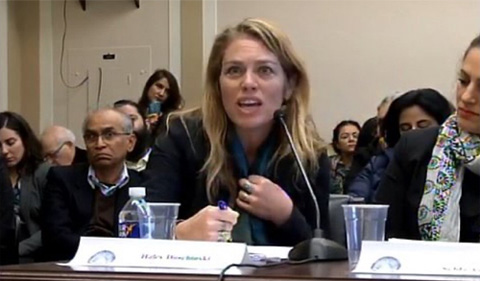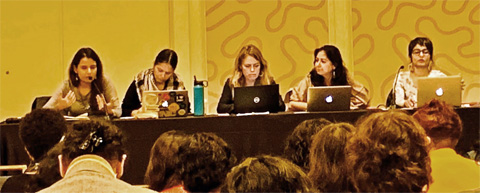“There is a human rights and humanitarian crisis unfolding in Kashmir, and the United States must take notice,” said Dr. Haley Duschinski, testifying before members of Congress at a Tom Lantos Human Rights Commission hearing Nov. 14 on “Jammu and Kashmir in Context.”
There is human rights and humanitarian crisis unfolding in Kashmir and the US must take notice, Haley Duschinski
says.
She has worked on the ground in 2010 & 2016, in #Kashmir. We are greatly indebted to Ms. @AnthroHaley for raising voice for the oppressed people of Kashmir. pic.twitter.com/vt6FK8XF0C— Legal Forum for Kashmir (@lfovkofficial) November 18, 2019
The U.S. House of Representatives founded the bi-partisan Tom Lantos Human Rights Commission in 2008.
Duschinski is Associate Professor of Anthropology; Director of the Center for Law, Justice & Culture; and Graduate Director of the M.A. in Law, Justice & Culture at Ohio University.
The congressional panel featured two Kashmiri American human rights lawyers, Ms. Yousra Fazili and Ms. Sehla Ashai, as well as human rights lawyer Mr. Arjun Sethi, Asia Advocacy Director for Human Rights Watch Mr. John Sifton, and social media influencer Ms. Sunanda Vasisht. Commissioner Anurima Bhargava of the US Commission on International Religious Freedom (USCIRF) provided testimony as well.
- The advocacy network Stand With Kashmir has published a full summary of the proceedings of the Tom Lantos Commission hearing on Kashmir.
One of five founding members of the Critical Kashmir Studies Collective, Duschinski followed the D.C. Congressional hearing with a Nov. 15 presidential panel on “Decolonizing Solidarities: The Case of Kashmir” at the National Women’s Studies Association meeting in San Francisco. The roundtable featured the five co-founders of the CKS collective: Mona Bhan (Associate Professor of Anthropology at Syracuse University), Hafsa Kanjwal (Assistant Professor of History at Lafayette College), Deepi Misri (Associate Professor of Women and Gender Studies at University of Colorado, Boulder), Ather Zia (Assistant Professor of Anthropology and Gender Studies at University of Northern Colorado), and Duschinski.
The Critical Kashmir Studies collective is a group of academic researchers studying sovereignty, counterinsurgency, settler colonialism, occupation and resistance in Kashmir.
- Learn more about Critical Kashmir Studies from #TheKashmirSyllabus, released in August 2019.
In anticipation of the panel, the NWSA Executive Committee issued a Statement on Kashmir, which reads in part:
India’s occupation of Kashmir has had a devastating impact on the 8 million Kashmiri people, disproportionately affecting Kashmiri women, who have been subject to rape and sexual violence at the hands of the Indian army, and many of whom have courageously brought such violence to light in the face of the Indian will to amnesia. The recent intensification of repression has turned Kashmir into an open-air prison. People are being detained, tortured, or disappeared. Schools and shops have closed. Public transportation has stopped running. People are dying from lack of access to healthcare and medicine, and a curfew has curtailed both livelihoods and necessary daily economic transactions. Thirteen thousand boys have been reportedly detained in service of India’s demographic warfare that will torture and kill Kashmiri Muslims. The lockdown includes a communication blackout with blocked internet access, limiting Kashmiri access to the outside world, and muzzling Kashmiri journalists who have sought to expose Indian atrocities in Kashmir. The control of the flow of information allows the Indian government to claim ‘normalcy’ in the face of horrific human rights abuses.
Testifying at the Tom Lantos Human Rights Commission
Duschinski’s testimony, held in the Rayburn House Office Building, highlighted the current human rights crisis as well as the longstanding Kashmiri struggle for self determination.
“The government of India claims that more than 3,800 people have been detained since Aug. 5, and that 2,600 of them have been released. Fact-finding reports indicate that the number of detentions is higher than 10,000. In a recent interview, leading civil liberties lawyer Parvez Imroz reported as many as 20,000 to 30,000 detentions, primarily of juveniles. Many of these are illegal, undocumented, and incommunicado detentions, which have a ‘disappearance effect’ as family members are unable to ascertain the whereabouts of the detainees,” she said.
“Credible international media outlets and Indian civil society reports have reported allegations of torture by armed security personnel, including broadcasting sounds of beatings and pleas for mercy over loudspeakers for the purpose of terrorizing the population.”
Duschinski also addressed politically charged issues relating to the sufferings and losses of the Kashmiri Hindu (Pandit) minority community, which she has extensively analyzed through her anthropological research.
“The Indian state, which is responsible for the security of civilians and property, utterly failed to protect Kashmiri Pandits’ internationally recognized rights as minorities and as victims of, and refugees from, an armed conflict. It is imperative to investigate all crimes against Kashmiri Pandits, through an international inquiry, since Indian criminal justice processes have failed,” she said.
“It is imperative that the pain and suffering of any Kashmiri community should not be instrumentalized, manipulated, or weaponized as a claim against other communities. As state subjects, and as persons displaced by the conflict, Kashmiri Pandits have legal and political stakes in the future of Kashmir. The international resolution of the Kashmir dispute requires justice, truth and a democratic and peaceful solution, in keeping with international law, for all Kashmiris.”
U.S. Representatives attending the hearing were Co-Chair James McGovern, D-MA; Co-Chair Christopher Smith, R-NJ; David N. Cicilline, D-RI; Sheila Jackson Lee, D-TX; Pramila Jayapal, D-WA; David Trone, D-MD; and Brian Fitzpatrick, R-PA.
Duschinski also chaired a Nov. 15 panel featuring Critical Kashmir Studies scholars at the University of California – Berkeley called “Understand/ing with Kashmir/is.”
Media Coverage of Duschinski and Kashmir
Huffington Post covered the Tom Lantos Human Rights Commission hearing in a story headlined “Kashmir: U.S. Lawmakers Highlight Internet Blackout, Mass Arrests.”
Al Jazeera quoted Dusckinski in a story headlined “At US congressional hearing on Kashmir, call to end lockdown.”
Duschinski in her testimony acknowledged that while an investigation into crimes against Kashmiri pundits still needs to happen, it should not be used as a mechanism to justify or erase other Kashmiris’ struggles.
“It’s imperative to investigate all crimes against Kashmiri pundits through an international inquiry since Indian criminal justice processes have failed,” Duschinski said. “It’s also imperative that the pain and suffering of any Kashmiri community should not be instrumentalised, manipulated or weaponised as a claim against other communities.”
The Anadulo Agency quoted Duschinski in a report headlined “US lawmakers host 2nd hearing on Kashmir.”
Haley Duschinski, director of the Center for Law, Justice & Culture at Ohio University, told the panel: “The Indian State, which is responsible for the security of civilians and property, utterly failed to protect Kashmiri Hindus’ [Kashmiri Pandits] internationally recognized rights as minorities and victims of and refugees from an armed conflict.”
But she clarified that despite leaving Kashmir, several thousand Kashmiri Hindus still live harmoniously with their Muslim friends and neighbors in Kashmir.
“There has never been a full and impartial accounting about what actually caused Kashmir Pandits to leave Kashmir,” she said.
Kashmiri Pandits left Kashmir valley in early 1990s when armed resistance against Indian rule started. Official records show nearly 219 of the community members were killed in the conflict.
“It is imperative that pain and suffering of any Kashmiri community should not be instrumentalized, manipulated or weaponized against any other community,” she said, adding that Kashmiri Pandits have legal and political stakes in the future of Kashmir.
Scholarship and Advocacy on Human Rights in Kashmir
Since August 5, Professor Duschinski has delivered other public lectures on the human rights situation in Kashmir.
On Sept. 27, she joined Mona Bhan, Hafsa Kanjwal, and David Ludden on a panel titled “Kashmir Today: Article 370 and Beyond” at New York University (NYU). The panel was co-sponsored by the Global Asia Program, the South Asia Program, and the Gallatin Human Rights Initiative.
On Oct. 7, she appeared on a panel on “Political Crises in Hong Kong and Jammu & Kashmir” hosted by The New School’s India China Institute.
In 2018, Duschinski co-edited the book Resisting Occupation in Kashmir (University of Pennsylvania Press) with Mona Bhan, Ather Zia, and Cynthia Mahmood.
Professor Duschinski is also part of the Kashmir Scholars Consultative and Action Network (KSCAN), which has been engaging in advocacy efforts in response to the current crisis.
- Read KSCAN letters and policy documents addressing the human rights crisis in Kashmir at this link.
Duschinski recently co-authored a column in Open Democracy titled “The International Community Must Intervene on Kashmir: Kashmiris Need Self-Determination, Not Military Occupation.” It is co-authored with Mona Bhan and Goldie Osuri (Associate Professor of Sociology at University of Warwick).
You can follow developing events on Professor Duschinski’s Twitter account, @AnthroHaley.




















Comments